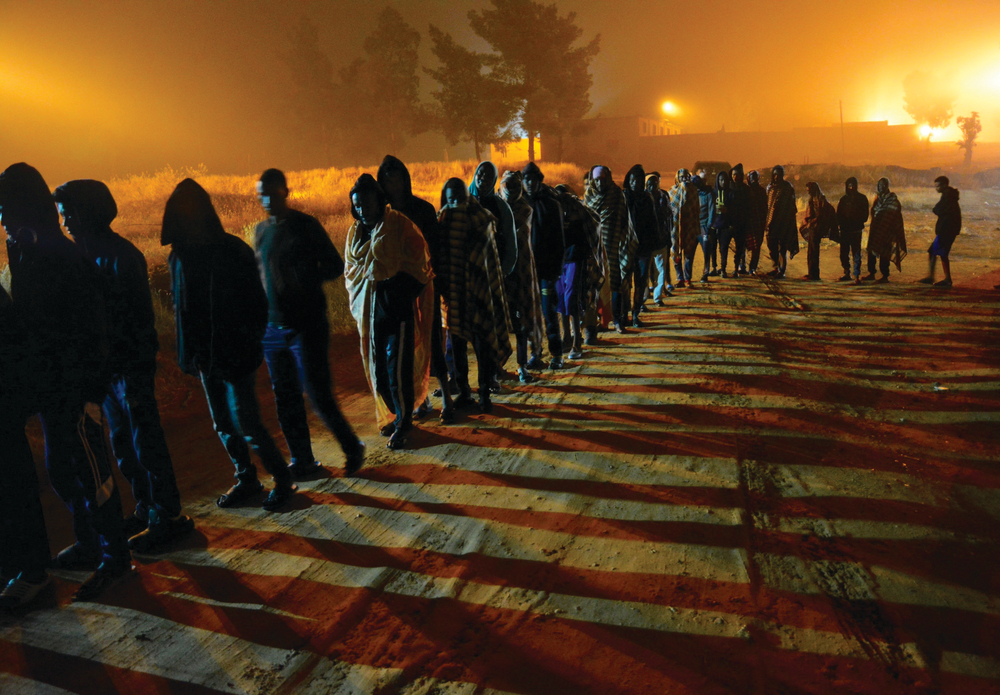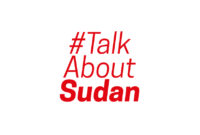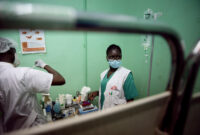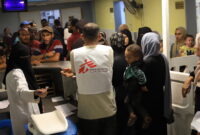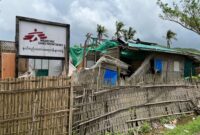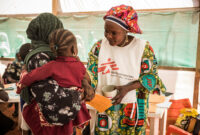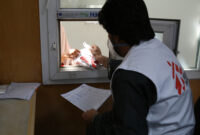Libya: Out of Libya – “I waited two years and five months to be evacuated and nothing happened”
Doctors Without Borders/Médecins Sans Frontières (MSF) calls on safe countries such as European and North American states, among others, to offer protection to migrants currently trapped in Libya to urgently accelerate the evacuation of the most vulnerable people by strengthening existing mechanisms and opening alternative pathways for them to leave the country.
Since the start of its humanitarian response for migrants in Libya in 2016, MSF has repeatedly been confronted with the impossibility of protecting them from harm, both inside and outside detention centres, and with the difficulty of ensuring continuity of medical care for people with the most severe physical and mental conditions, including victims of torture.
“In Libya, the majority of migrants are victims of arbitrary detention, torture and violence, including sexual violence, says Claudia Lodesani, MSF operations manager for Libya. They have extremely limited possibilities of obtaining physical and legal protection. As a result, the deadly migration route via the Mediterranean Sea is often their only way out. We believe that safe countries, especially in the EU – which has been funding the Libyan coastguard for years and encouraging the forced return of migrants to Libya – have a duty to facilitate the evacuation of these victims of violence and to protect them on their own soil.”
Out of Libya – Creating Safe Pathways for Migrants
Today MSF releases a report entitled Out of Libya which describes the weakness of existing protection mechanisms for people stuck in Libya. The few legal pathways to safe countries set up by the UN’s Refugee Agency (UNHCR) and the International Organization for Migration (IOM) are slow and restrictive. People of only nine nationalities can be considered for registration, access to registration is almost non-existent outside Tripoli and in detention centers, and the number of relocation slots in destination countries is very limited. Of the approximate 40,000 people registered with the UNHCR’s resettlement programme just 1,662 left Libya last year, while some 3,000 people left through the IOM’s voluntary return programme. In total, around 600,000 migrants live in Libya.
MSF’s report also presents various alternative solutions, such as those instigated by aid organisations in association with governments. In Italy, a humanitarian corridor has already been opened and is allowing the evacuation of a number of highly vulnerable people in vulnerable and in need of protection, including patients treated by MSF in Libya. Meanwhile in France, discussions are underway with the authorities to evacuate survivors of torture and violence as well as people with serious medical conditions, who would be taken care of by MSF on arrival in France. MSF calls for this type of mechanism to be duplicated in other safe countries.

“The medical care of people who are arbitrarily and indefinitely detained, or at risk of systematic violence, poses many dilemmas,” says Jérôme Tubiana, MSF advocacy manager for Libya. “Realistically, what we can do to help them in Libya is limited. To truly protect the most vulnerable people, we must first and foremost, and urgently get them out of the detention system and out of the country.”
MSF is one of the few international NGOs working in Libya. Its teams provide general healthcare and psychosocial support to migrants held in detention centres and living in makeshift housing. MSF also organises the transfer of more seriously ill people to hospital and helps those who wish to do so to register for the UNHCR and IOM’s programmes to help them leave the country.
Waiting for nothing
Like most Eritrean refugees and asylum seekers, John, now 38, left his country to escape mandatory national service for an indefinite period, which the United Nations describes as “akin to slavery”. MSF teams met him for the first time in June 2019 in a Libyan detention centre, when he was seriously ill and desperate to leave the country for Europe. John tells the story of almost three years spent in Libya, during which time he was incarcerated in four detention centres successively.
“The first time I tried to cross the Mediterranean was in December 2017. The smuggler had warned us: ‘Some of you will leave today and the others tomorrow.’ We stayed on the shore as 180 people boarded a boat before breaking down off the coast of Libya. The coastguards brought them back to shore and some of them were able to call to us: ‘Don’t go to sea, it’s too bad!’ Along with 24 other Eritreans, we fled. A few days later, the boat I was to take sank. Eighty people drowned. This happened shortly after my arrival in Libya.

After fleeing Eritrea, I worked in Sudan to save money to cross the Sahara and then the Mediterranean. But I realised that the sea was dangerous, that many migrants were drowning, and I got scared. At the same time, the UNHCR began registering asylum seekers like me and resettling some in Europe and North America. As registration was done primarily in detention centres, I decided to lock myself up in a centre in Tripoli. I was registered in March 2018. I spent seven months in this centre, then the fighting resumed in Tripoli. We were transferred to another detention centre, isolated in the mountains near Zintan.
Many inmates fell ill. I coughed constantly. I didn’t know it yet but I had contracted tuberculosis. The director of the centre and doctors from an international organisation selected about 40 detainees, promising us that we would be transferred to a hospital in Tripoli. Instead, we were taken to another detention centre and locked in a container for several months. Eight of us died from the disease. It was during this period, in April 2019, that I met the teams of MSF. Their doctors examined us and started transferring us to hospitals.
The detention centre was located on a frontline between rival militias. Shelling was frequent and bullets often entered the compound. One day, we were put on a bus and told: ‘You’re in a war zone, we realise that this place is not safe for you. You will be driven to the UNHCR Gathering and Departure Facility in Tripoli.’ Everyone was happy. It was known that those who were housed in this centre were selected to be evacuated from Libya to Europe or North America. Then, when we reached Zawiya, 50 km from Tripoli, a UNHCR employee told us that there was no reason for us to go to the Gathering and Departure Facility. They left us in Tripoli and gave us 450 Libyan dinars [121 CAD], barely enough to last two weeks.

UNHCR said we were going to live safe in this city, but for us Tripoli is neither free nor safe. The neighbourhood of Gargaresh is full of drug addicts, finding work is very difficult, people point guns or knives at you and they can even kill you. Some of us preferred to return to a detention centre rather than risk our lives on the streets of Tripoli. I lived in an abandoned building with 110 other refugees, mostly Eritreans. We were sometimes 12 per room.
One day we went to the UNHCR office to ask for help and we were robbed by militiamen manning a checkpoint in the town. Some of us tried to work, but we weren’t paid or our money was stolen. It happened to me in the hospital where I worked as a cleaner. A militia commander tried to recruit me into his forces to fight alongside them. We fled Eritrea not to become soldiers, how could we make war in Libya?
The period of the coronavirus has been terrible for us. Those who used to work couldn’t find jobs anymore. Some were imprisoned and beaten. Employers were afraid that black Africans would infect them with corona. We were thin because of other diseases and lack of food, but when people saw us in the streets, they believed we had corona.
I was still waiting for UNHCR to contact me to get me out of Libya. I waited for two years and five months and nothing happened. Why to stay in Libya if UNHCR is not calling me? Trying to cross the sea is facing death, but staying in Libya is facing death too.
If the refugees attempt the crossing, it is because they are desperate. I was desperate. In November 2020, I finally decided to attempt the crossing again. I boarded a boat with 100 migrants. We reached the island of Lampedusa in Italy on our own.

Many of my comrades are still stuck in Libya. Of the 40 who were evacuated with me from Zintan, two died of tuberculosis in Tripoli. Two others disappeared in the Mediterranean. A friend was captured by the Libyan coastguard and locked up again in a detention centre. Three managed to cross, like me. As far as I know, only four have been selected for resettlement by UNHCR. So many died in Libya during the three years I spent there. Today, I am safe in Europe. I have a job. I’m free. But I lost a lot, I can’t get back what I lost.”
